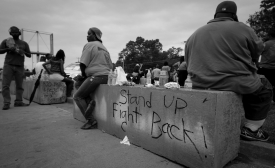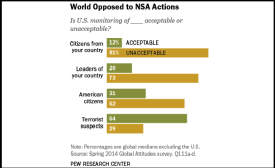nsa

Seib weighs in on "the U.S. Image Problem."

How the world views the U.S., China, and the competition between the two major rivals.
Voters, journalists and just about everyone paying some attention to politics all tend to over-estimate the power of the president. When Barack Obama swept into office in 2008, Americans were dazzled by his promises of change at home and a more judicious mix of strength and humility abroad. Indeed, it was hoped the president would rescue America’s image after eight years of George Bush's brand of ham-fisted, cowboy-booted diplomacy.
The German authorities have summoned the US ambassador in Berlin after a man was arrested on suspicion of spying. The US diplomat "was asked to help in the swift clarification" of the case, the foreign ministry said. German officials confirmed the arrest but released no other details. US-German ties were strained after allegations last year that the US National Security Agency (NSA) bugged Chancellor Angela Merkel's phone as part of a huge surveillance programme.
The European Commission has said it is determined to “redraw the global map of internet governance” as massive US surveillance has damaged public trust in the web, and said it is ready to negotiate with Washington for control of web architecture. The commission, the EU’s top executive body, on Wednesday proposed a key reform to the way the internet is managed and run, saying that Europe will “pursue a role as honest broker” in future global negotiations on the issue.
Jihadists have been on the internet a long time, and they probably know how to use it better than you do. Since the early years of the world wide web, radical Islamist groups used it for a number of different jihad-y means, from recruitment and financing to propaganda and communication. But how has this changed over the past decade, and in the wake of Edward Snowden's revelations of NSA spying, what does the future hold for jihadists and the internet?
About the foreign policy being carried out with taxpayer money, in our names: Does the American public want to spend billions of dollars helping Colombia to assassinate the leaders of its leftist insurgency movement (with apparent success, such that the rebel forces are in disarray)? Do Americans want their NSA and CIA directly complicit in a Latin American army's program of assassinations?







